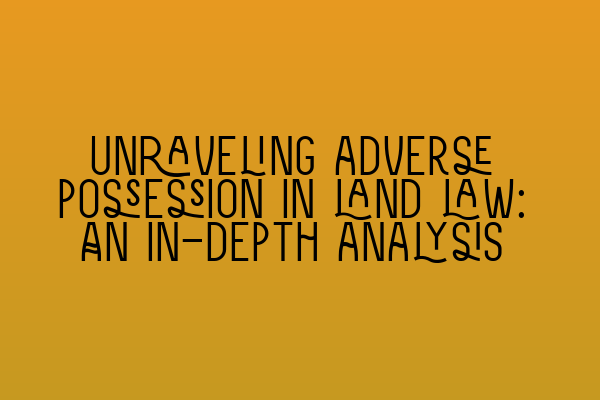**Unraveling Adverse Possession in Land Law: An In-depth Analysis**
**Introduction**
Welcome to SQE Property Law & Land Law, your trusted solicitors specializing in property law matters. In this blog post, we will take a comprehensive look at adverse possession, a concept that often raises eyebrows and sparks curiosity in the world of property law. Whether you are a property owner, an aspiring homeowner, or a legal enthusiast, this in-depth analysis will unravel the intricacies of adverse possession and shed light on its legal implications.
**Understanding Adverse Possession**
Adverse possession refers to a legal principle that allows an individual to gain ownership of a piece of land by occupying and utilizing it openly and exclusively for a specified period, typically several years. This concept may seem puzzling at first, as it challenges traditional notions of property rights and ownership. However, it serves a vital purpose in the legal system by preventing abandoned or neglected land from lying dormant and encourages its productive use.
**The Requirements for Adverse Possession**
To successfully claim adverse possession, certain criteria must be met. These requirements act as protective measures, ensuring that adverse possessors have genuinely maintained, possessed, and occupied the land, without any legal challenge from the true owner. The key requirements typically include:
1. **Actual Possession:** The adverse possessor must physically occupy the land and treat it as their own. Mere intentions or occasional use would not be sufficient to establish adverse possession.
2. **Exclusive Possession:** The possession must be exclusive to the adverse possessor and not shared with others, including the true owner.
3. **Open and Notorious:** The adverse possessor’s occupation of the land must be obvious and visible to the true owner, leaving no room for doubt or misunderstanding.
4. **Continuous Possession:** Adverse possession requires continuous occupation of the land for a specified period, usually ranging from 10 to 20 years, depending on jurisdiction.
5. **Hostile Possession:** The adverse possessor must possess the land without the true owner’s permission, without any consent or agreement in place.
6. **Claim of Right:** In some jurisdictions, adverse possession may require the adverse possessor to believe that they have a legal right to the land, while others require no such belief.
**The Legal Implications**
Adverse possession, although a complex and often controversial legal concept, serves several important purposes. It helps bring idle and underutilized land back into productive use, promoting efficient land allocation. It also provides stability and certainty to property rights, as long as the required period of occupation is fulfilled without interruption or challenge from the true owner.
However, adverse possession also raises understandable concerns. The true owner may be deprived of their property without their knowledge or consent. Therefore, the legal system carefully balances the interests of both adverse possessors and true owners, weighing factors such as good faith, notice, and the impact on third-party interests in determining the outcome.
**Challenges and Case Studies**
Adverse possession cases can be complex and contentious. Disputes may arise regarding the fulfillment of the required elements, the true owner’s knowledge of the adverse possession, or conflicting evidence regarding the nature of the possession. Let’s explore a few notable case studies:
1. **Tulk v. Moxhay (1848):** This landmark case established the principle of “covenant running with the land,” which prevents landowners from potentially hindering future development of the land by imposing restrictive covenants.
2. **Pyer v. Carter (1857):** In this notable case, the Court highlighted the significance of intention and exclusivity in adverse possession claims.
3. **J.A. Pye (Oxford) Ltd v. Graham (2002):** This case showcased the limitations of adverse possession, emphasizing the importance of legal action by the true owner to prevent adverse possession claims.
**Seeking Legal Advice**
If you find yourself involved in an adverse possession dispute or require legal advice on property matters, our team of expert solicitors at SQE Property Law & Land Law is on-hand to offer you professional guidance and representation. We understand the nuanced nature of adverse possession and can assist you in navigating the complexities of land law.
**Conclusion**
In summary, adverse possession is a fascinating and intricate concept within land law. It provides a mechanism for individuals to gain ownership of abandoned or neglected land, while also safeguarding the rights of true property owners. The requirements for adverse possession are stringent, and disputes in this area can be complex. Seeking legal expertise is crucial to ensuring your rights are protected and understood.
At SQE Property Law & Land Law, we pride ourselves on our expertise in this evolving legal domain. Contact us today for tailored advice and comprehensive support on all your property law needs.
